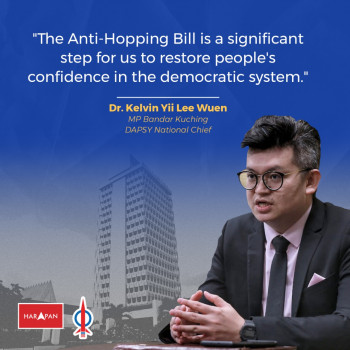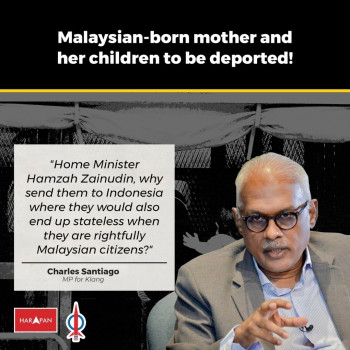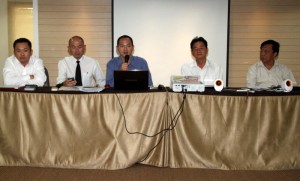 Thus far, the proceedings of the Sabah RCI has unveiled shocking evidence of a systematic effort by the National Registration Department, with the cooperation of the Election Commission, to give out blue identity cards to immigrants whose status as Malaysian citizens were questionable.
Thus far, the proceedings of the Sabah RCI has unveiled shocking evidence of a systematic effort by the National Registration Department, with the cooperation of the Election Commission, to give out blue identity cards to immigrants whose status as Malaysian citizens were questionable.
This was for the expressed purpose of registering them as voters and increasing the percentage of Muslim voters in order to gain an electorate advantage for the Barisan Nasional (BN) especially in marginal seats, in the lead up to the 1994 Sabah state elections.
But up to this point, there proceedings of the RCI have not dealt with item C in its terms of reference which requires that the Sabah RCI on immigrants: “To enquire whether the immigrants in Sabah who hold blue identification cards, temporary identification receipts (blue) or citizenship which is not in accordance with the law have been registered in the electoral roll”.
Investigations reveal ‘problematic’ IC numbers
To address this gap, the Malaysian Electoral Roll Analysis Project (MERAP) has started an investigation to examine the impact of the issuance of ICs to immigrants on the electoral roll. Our initial findings have revealed equally shocking and disturbing findings.
Ruslan bin Alias, an assistant head in the IC division of Sabah / Sarawak in the National Registration Department, revealed a list containing 130,459 ‘problematic‘ old IC numbers where their records with the NRD was either incomplete or where these cards had already been cancelled (Exhibit P9 of the Sabah RCI) .
These old ICs numbers were divided into lists P1 (51,300 old IC numbers), P2 (62,550 old IC numbers) and P3 (16699 old IC numbers) (Appendix 1 below). Old IC numbers in lists P1 and P2 have been identified as ICs without proper or having incomplete information in the NRD. Not all of the ICs in lists P1 and P2 have been cancelled. Old IC numbers in list P3 have already been cancelled and thus are not in use anymore.
According to Ruslan, whose unit is in charge of investigating the problematic ICs in P1 and P2, only 8553 ICs in these lists have been investigated. Of these 8553, 4851 (or 57%) were rejected as legitimate ICs. This means that 105,927 old ICs in lists P1 and P2 have not been investigated.
MERAP did a search of the old ICs numbers given in lists P1 and P2 using the Q1 2012 electoral roll and we found 60653 (53% out of 113,850 voters in lists P1 and P2) with these problematic IC numbers that were on the electoral roll. We also found 20 old IC numbers given in lists P3.
These voters are not evenly distributed across the state. 8 out of the top 10 parliamentary constituencies featuring these voters can be found on the east coast of Sabah (Appendix 2 and 3). 66% or 39750 voters out of the 60673 problematic ICs can be found in these 8 parliament seats on the east coast of Sabah.
IC duplications discovered
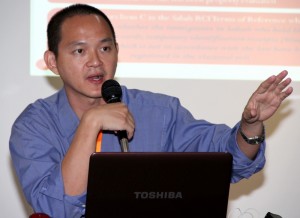 In addition, we also found 29 instances of old IC duplications from lists P1 and P2. These voters are still on the electoral roll at the time of writing (even though the old IC numbers of some of these voters do not appear in the SPR website) (Appendix 4).
In addition, we also found 29 instances of old IC duplications from lists P1 and P2. These voters are still on the electoral roll at the time of writing (even though the old IC numbers of some of these voters do not appear in the SPR website) (Appendix 4).
MERAP also found that the 20 voters with old ICs from list P3 that were on the electoral roll in Q1 2012 were deleted in Q4 2012 because they were wrongly registered / ‘silap pendaftaran’ (Appendix 5). How did these voters manage to stay on the electoral roll up until Q4 2012 when these ICs were supposed to have been cancelled in 1996?
Who was responsible for registering these voters with cancelled ICs? According to the data collected previously by MERAP, all these voters were registered after 1996 when these ICs were supposed to have been cancelled.
Even if these are the only problematic voters currently on the electoral roll, they would constitute 6.3% of the Q3 2012 electoral roll. In 7 parliament seats, they would constitute more than 10% of the total electorate including P191 Kalabakan (16.3%), P188 Silam (15.2%) and P190 Tawau (14.4%)(Appendix 6).
As a result of the addition of voters with problematic ICs (and perhaps others which have not been identified), the character of many of these seats have been altered significantly.
NRD and EC must take action
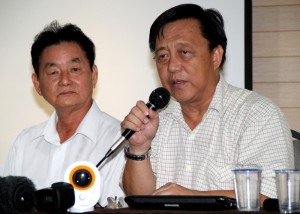 In light of the large number of voters with problematic ICs that are still in Sabah’s electoral roll, we call on the NRD and the EC to immediately conduct a comprehensive exercise to identify ICs that were wrongly given out and to take out these voters from the electoral roll before the 13th general election.
In light of the large number of voters with problematic ICs that are still in Sabah’s electoral roll, we call on the NRD and the EC to immediately conduct a comprehensive exercise to identify ICs that were wrongly given out and to take out these voters from the electoral roll before the 13th general election.
The failure to do so would mean that the EC is allowing the 13th general election to go on with a seriously compromised electoral roll, especially in the state of Sabah. This would affect the legitimacy of the election results especially in the areas with the largest number of people with problematic ICs who are registered as voters.
Sabah DAP also calls all Sabahan working or living overseas, including those in Peninsular Malaysia, to come back to Malaysia to vote during GE13. As such, Sabah DAP is launching a “Save Sabah, Save Malaysia” campaign. The larger the number of genuine voters, the greater the chances of diluting the impact of dubious voters.
The recent Sulu invasions in the Lahad Datu and Semporna areas have shown the serious impact as a result of Project IC. The hot spot conflict areas are all located in the east coast of Sabah and it cannot be coincidental that these are areas which have a high number of dubious voters.
There is no exact figure of how many Sulus there are in Sabah as many of them register themselves as Bajaus in the census. We are deeply concerned that the conditions have been created for a “Reverse Takeover” which have been caused by the high number of immigrants that have made us strangers in our homeland.
Joint statement by:
Sabah DAP Chairman and Sri Tanjong ADUN Jimmy Wong
Sabah DAP Secretary Dr Edwin Bosi
Sabah DAP Publicity Secretary Chan Foong Hin
Dr. Ong Kian Ming Election Strategist, DAP & Director of the Malaysian Electoral Roll Analysis Project (MERAP)

